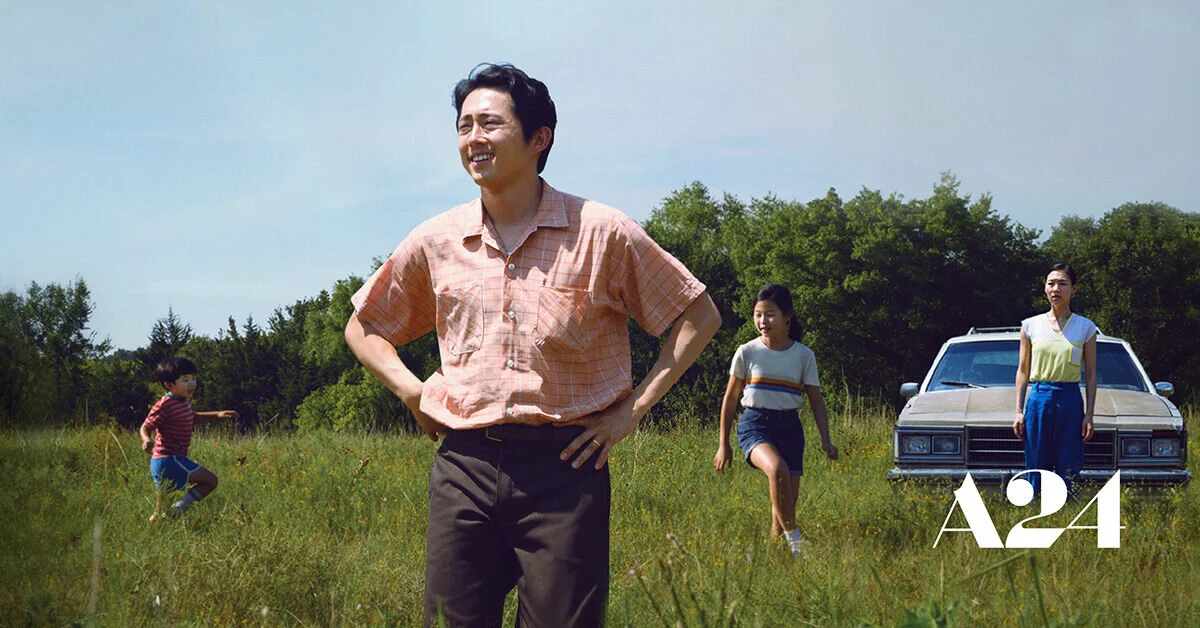FILM REVIEW: “Minari” is a mesmerising, earnest, and quietly devastating American epic
The Minari plant goes by many names: the Korean Watercress, Japanese Parsley, Indian Pennywort, Chinese Celery, or, if you want to get scientific about it, the Oenanthe Javanica. It’s a vegetable of boastful distinction; a signature herb in dishes across Asia that is one of the very few edible species of the otherwise extremely toxic water dropwort family. But if you ask Steven Yeun, the star of writer-director Lee Isaac Chung’s semi-autobiographical film Minari, about its titular plant, you will learn that it can also be a force of transformative perseverance. Typically found near creeks and waterways, the Minari plant can thrive even in the harshest of environments, often purifying the water and soil around it in the process. And just like the vegetable, the film managed to extend its roots deep into the cold, unfeeling wasteland that is my heart, and replenished my soul in the process.
A joint venture between A24 and Plan B (the same partnership that brought us indie gems like Moonlight and The Last Black Man In San Francisco), Minari follows the trials and tribulations of a Korean-American family, the Yis, as they try to build a new home on their in 1980s rural Arkansas. In search of a better life for his family, Jacob (Yeun) uproots his family of four from California, where he and his wife Monica (Ye-ri Han) worked at a hatchery as chicken sexers, to a new plot of land in the Ozarks, where he hopes to turn into a fertile farm of Korean produce that they can earn a living from.
While western cinema is certainly no stranger to deconstructing the American Dream, movies that delve into the complexities of this topic, especially the more revered ones, tend to do so with a polish of spectacle and grandeur. Greatest-of–all-time Citizen Kane was a groundbreaking mystery about the final words of a dying tycoon; The Godfather trilogy is a silhouette-laden crime drama about the ruthless, violent, and often romantic machinations of the Italian Mafia in late 1940s New York; and The Social Network is witty, Rashomon-style deposition of friendship, betrayal, and the allure of success in the digital age. What is the price of pursuing the American Dream? These films, with all their style and flourish, tackle this question with time-spanning, perspective-shifting, larger-than-life narratives that earn them the label of “American epic”. And then comes a movie like Minari, with a grounded, linear, slice-of-life story about an immigrant family trying their best to survive in their new home, that asks the same questions in a way that is no less American, and no less epic.
The American Dream, and the power of zooming-in
Chung reckons with the big themes of his story with a laser-focused screenplay that zooms in on the small, minute moments of the characters’ lives, whether if it’s Jacob digging for water while giving a lecture about life to his 6-year-old son, David (Alan Kim, in an absolutely delightful breakout performance), or Monica begrudgingly tossing their trash into a fire pit, bemoaning their move away from the city with their older daughter, Anne (Noel Kate Cho).
With such attention to detail, it comes to no surprise that the first thing that hooks you about Minari is its authenticity. From the moment a very shell-shocked Monica (Han, in a tour-de-force supporting role) stumbles into the single-wide mobile home she was not informed they would be living in (“This is not what you promised”), to the moment Monic’s mother, Soonja (Yuh-Jung Youn), popping a chestnut into her mouth before passing it to her grandson to eat “just in case it got stale” from the plane ride, the film somehow performs this magic trick where it is able to captivate us through the little, specific moments of mundanity.
How Minari manages to achieve this feat is largely a credit to the fierce commitment of the ensemble cast portraying the family at the centre of this story, lead by Steven Yeun in the role of a lifetime that showcases his impeccable range as an actor post-Walking Dead. Yeun channels a kind of quiet magnetism as Jacob; it’s an earnest performance that places us firmly into Jacob’s shoes as he takes on the gargantuan tasks of 1) fulfilling his dream of growing a farm, and 2) convincing the rest of his family (or more importantly, his wife Monica), that the dream is at least worth chasing. Jacob makes plenty of mistakes throughout the film, mistakes that often impact his relationships with those most important to him, but it is a testament to Yeun’s nuanced portrayal of this character that we root for Jacob deeply to succeed, despite feeling frustrated by some of his actions.
The rest of the cast also fire on all cylinders in this film. The yin to Yeun’s yang, co-star Ye-ri Han has the biggest challenge of conveying typically reserved Monica’s inner life with limited dialogue. She hits it out of the park through body language alone, expressing so much of Monica’s longing for her old life, along with her growing discontentment of her new one (and, by extension, her husband), through subtle glances and facial expressions. There are so many layers to Han’s understated but heartbreaking performance that keeps us transfixed and wondering what exactly is going through her mind, as she struggles to regain a sense of agency in her life.
If the partnership between Yeun’s Jacob and Han’s Monica represent the backbone that holds up the narrative of Minari, then the relationship between 8-year-old David and his vivacious grandmother, Soonja, is the film’s beating heart. The performances of child actors tend to make or break movies that place children at the centre of their stories, but adorable and capable newcomer David Kim is more than up to the task. Together with legendary Korean actress Yuh-Jung Youn (who improvised some of her scenes) as his grandmother, the pair exude a kind of gleeful mischievousness and crackling chemistry that we can’t help but fall in love with. Drawn directly from Chung’s own relationship with his grandmother, Kim and Youn are able to forge a bond that fills our hearts with joy, before breaking them completely. Meanwhile, Cho is quite effective as David’s stoic older sister Anne, but she gets lost in the shuffle here, and unfortunately, the screenplay does not give her character as much of a chance to shine as the rest of the family.
A modern fable, and the power of simplicity
The seed of Minari’s story was planted when Chung started jotting down memories of his own childhood in Lincoln, Arkansas - when his father moved them to the farm; when his mother expressed the same shock as Han’s Monica does at the sight of the single-wide trailer that would be their new home. While not exactly a one-to-one retelling of his life, Chung gathers the kernels from his childhood and turns them into a narrative arc with themes of family, and resilience in the face of failure.
With such a rich tapestry of nostalgia, emotions, and the countryside landscape to draw from, it would have been very easy for Australian cinematographer Lachlan Milne, whose past credits include Stranger Things and Hunt for the Wilderpeople, to flex his DP muscles and bring a highly stylised visual approach to the film. Instead, the elegant restraint of Milne’s cinematography, consisting mostly of single-camera scenes and wide compositions, elevates the already pitch-perfect performances of its ensemble cast by placing the spotlight entirely on them, and how they are situated in relation to each other and their environment. Close-ups are used quite sparingly, which only means that they are much more affecting when we see them during pivotal character moments. The film’s postcard-esque visual simplicity, bolstered by composer Emile Mosseri (Kajillionaire, The Last Black Man in San Franciso)’s sweepingly tender and heart-rending score, manages to transform a very specific and grounded family drama into a modern fable about the Asian-American immigrant experience that evokes the likes of Terrance Malick, the Dardenne brothers, and Hirokazu Koreeda.
Feeling seen, and the power of representation
There is a reason why Minari hits so close to home. Of course, the film resonates with children of immigrants, who get to appreciate the struggles their parents faced when building a new life in a foreign environment. It resonates with Asian people in western countries, who get to feel that validating glow of seeing ourselves represented in cinema as real, complex human beings.
But it also resonates with people who grew up in countryside farms, who experienced the freedom of the vast plains, along with the risks that come with it; with couples who feel like they just can’t seem to be on the same wavelength about what is really important to each other; with grandchildren who feel that pang of guilt for not being nicer to their grandparents when they were around; with determined dreamers who persevere through insurmountable odds to pursue their goals. Perhaps the biggest triumph of Minari is that, through its honest and humanistic storytelling, it makes us feel seen, in one way or another.
5 out of 5 stars
If you liked Minari, you might enjoy these movies:






